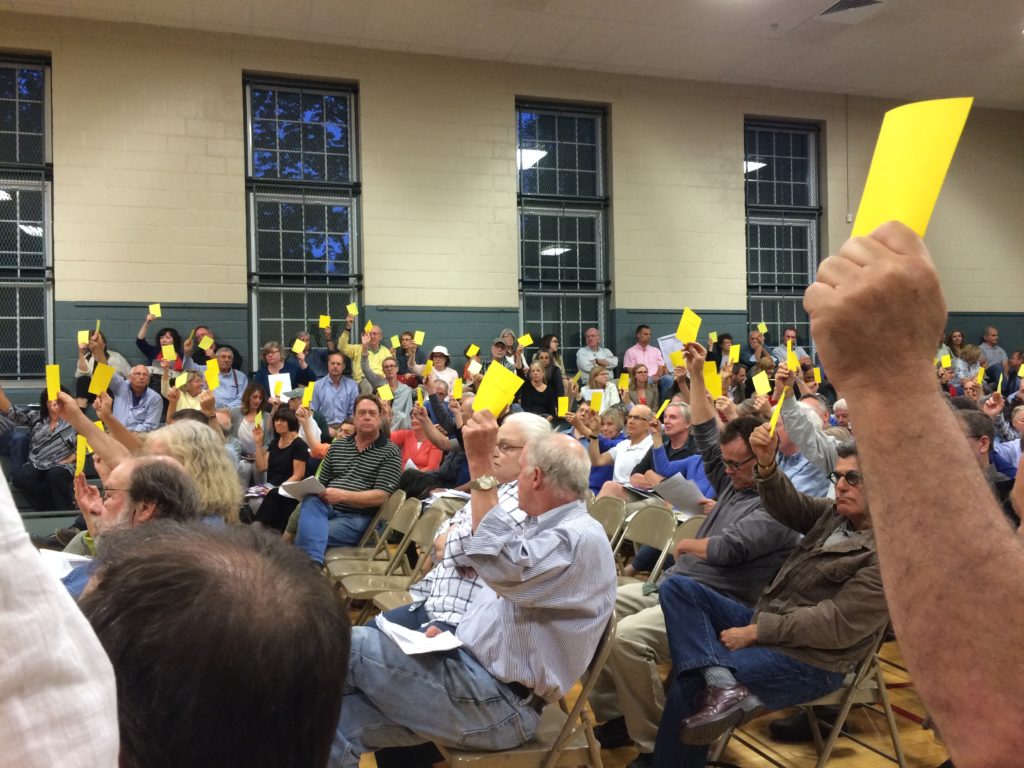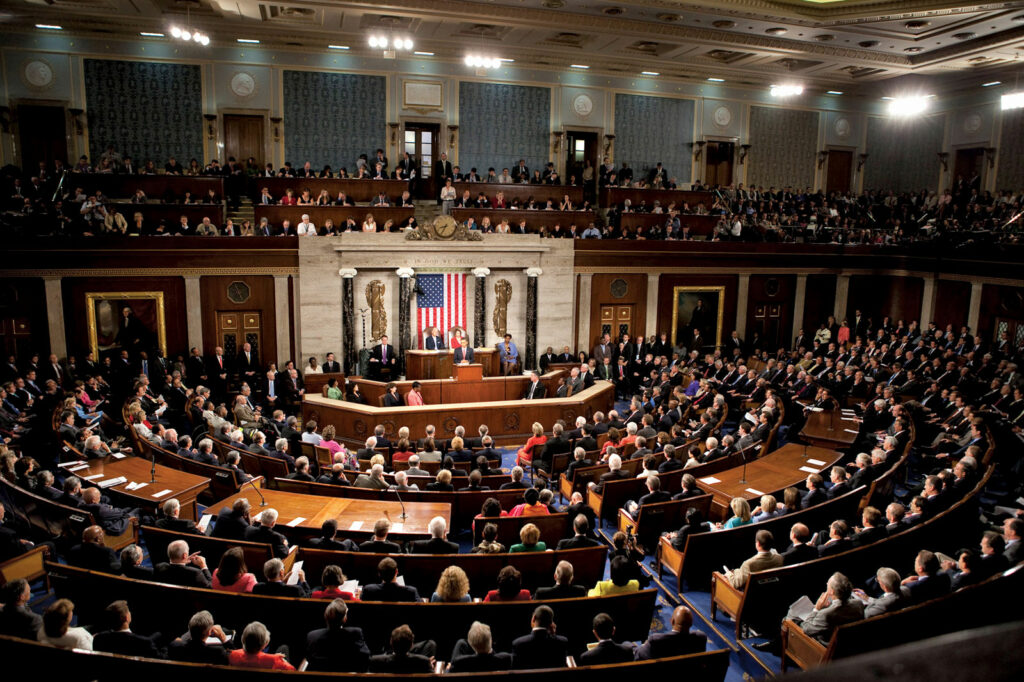Tempe, AZ. As an American, I’ve always gravitated more to the independent frontier spirit than the Tocquevillian township spirit. But rugged individualists need not be atomists; and there are compelling reasons why even Enlightenment liberals should be front porch republicans.
I may seem like an unlikely Porcher. I’m a card-carrying Lockean liberal. I’ve long argued that Locke’s political philosophy is not itself the enemy of community, tradition, or Christianity. On my interpretation, this political philosophy actually provides a crucial complement to these other goods of human life and action. Self-governing Lockean liberals can also be communitarians. In addition, I’m deeply sympathetic to the seriousness of racial justice concerns in American history, up to and including our own time. Though I have fundamental disagreements with Critical Race Theory and its variants, I share the view Lincoln expressed in his debates with Douglas that there has always been a “system” of racism in the U.S.
Both of these commitments, though, lead me to a conclusion that seems to run directly counter to the political positions usually embraced by those who share my Lockean liberal premises. The conclusion is this: that our federal and state governments in the U.S., as they operate today under the Constitution, are enemies of self-government. The power they wield and exercise over individuals, and the suffocating effect they have on the vitality of local communities, run afoul of the Lockean liberal principles that infuse the Declaration of Independence. These principles demand communal self-government; and such government is only possible at the local level.
I have not come to this conclusion lightly. I’ve devoted much of my career to the study and teaching of the American Founding. I believe American history is filled with great statesmen who have lived and died in admirable dedication to the principle of self-government. I believe most of the American Constitutional Framers—including some who were tragically deluded into excusing their involvement in the institution of slavery—engaged in a profoundly instructive effort to design a self-governing republic for the United States. American political thought, development, and history has much, in my opinion, to teach us all.
And yet the sinister effects of our national and state governments on the exercise of self-government in the U.S. have been lurking in my peripheral vision for quite some time now, like the villain in a horror movie you wish weren’t there. The anti-big-government argument I have in mind is not a recapitulation of the arguments of the anti-Federalists. There are, to be sure, important points of agreement between my argument and theirs. The argument I have in mind, though, is made with the benefit of hindsight, of distance from their particular historical context, and of the growth in national power, prosperity, and size that has been enabled by the success of the Federalists and the Constitution they defended.
The argument begins with the premise of individual human freedom. I realize that this is not an uncontroversial premise, particularly for FPR readers. It can and often does connote unfettered individualism, a distorted privatism, and a disregard for the naturalness of human community. Patrick Deneen, Rod Dreher, David Schindler, and others have pointed out the problematic pathologies of the Enlightenment premise of individual human freedom quite persuasively. Readers for whom this is a stumbling block may conceive this premise rather in pre-modern or religious terms: freedom entails self-directed fulfillment of the human telos. In Aquinas’s terms, individual human freedom means the capacity to “provide for oneself and others” in a manner imitative of God in His creative and provident freedom.
This descriptive premise casts a moral shadow that falls on two sides, depending on the direction of the light thrown on it: it creates a positive obligation on the part of individuals to govern themselves—as in the medieval conception of natural law—and also an obligation of forbearance on the part of others from coercion without consent. Freedom requires both Aristotelian-Thomistic prudence and Lockean natural rights. Combined with the natural human inclination to seek community with others, the premise of human freedom leads inexorably to the moral imperative of communal self-government.
John Locke’s account in the Second Treatise starts with individual freedom and ends with the social compact. The Declaration of Independence starts with individual rights and ends with government by consent. In both cases, the starting point of individual freedom leads logically to communal self-government. Viewed in this simple way, the old debate between communitarians and liberals becomes a resolvable tension rather than an intractable divide; Lockean self-governing liberals must commit to communal self-government as a logical necessity.
This is why the Constitution begins with the words “We the People.” This is why James Madison, James Wilson and other leading Constitutional Framers insisted upon ratification by special conventions conceived to represent the people rather than the states. This is the hinge on which Alexander Hamilton’s argument in Federalist 78 turns. If the Constitution itself isn’t a reflection of the “will of the people,” the Supreme Court’s exercise of judicial review is unjustifiable.
This is also why Congress at the national level, and the state legislatures at the state level, are charged with the sole power of making laws. Legislation is supposed to be the way in which the moral imperative of communal self-government is implemented. Laws are generally applicable—and, crucially, enforceable—rules limiting the behavior of those who live under them. Because they do this, they must also align with the other side of this moral imperative: they must reflect the will of the people against whom they are enforceable. Jefferson voiced this point in his 1816 letter to Thomas Kercheval when he wrote that genuinely republican governments must “embody the will of the people, and execute it.”
But surely—some of my readers may say at this point—Jefferson was taking this requirement too strictly. According to the “advances in the science of politics” Alexander Hamilton lauds in Federalist 9, as well as Madison’s famous argument distinguishing a republic from a pure democracy in Federalist 10, the mechanism of representation both enables communal self-government and creates a degree of wiggle-room in what counts as “representation.” Representatives need not merely transcribe the will of those they represent to count as genuine representatives. They can “refine and enlarge the public views,” and can interpret their electoral victories as general mandates to embody the self-government of the community they represent. A vote cast for a representative can signify an authorization of a representative’s contribution to one’s self-government in community.
This has become the conventional wisdom, and the assumption upon which the legitimacy of the federal and state governments rests. The anti-Federalists had disagreements with this definition of representation from the beginning. Anti-Federalist writers agreed with Madison and Hamilton that representation was a next-best to pure democracy, an alternative to the ideal that was necessitated both by matters of size and function. Pure democracies are impossible in a political society of any size greater than a township. They are also prone to the problem of “majority faction” or tyranny. But anti-Federalist writers took this next-best status of representation more seriously than did most Federalists. They insisted that the mechanism of representation depart as little as possible from the most direct compliance with the moral imperative of communal self-government.
Even admitting the justifiability and desirability of the mechanism of representation, however, it is obvious to the objective eye that the original Constitution failed to implement it in a manner congruent with the republican principles that both the Federalists and the anti-Federalists shared. In Federalist 39, Madison said that it is “essential” to a republican government that it be “derived from the great body of the society, not from an inconsiderable proportion, or a favored class of it.” As we all know, however, neither white women nor enslaved African Americans could plausibly be said to be a source from which the federal (or state) government was “derived.” It was, in fact, a “favored class”—whether described in terms of free Americans, white Americans, white male Americans, or white male propertied Americans—from whom the federal and state governments were derived in the 1780s. Madison intimated as much in his “Vices of the Political System of the United States,” writing that “where slavery exists, the republican theory becomes still more fallacious.” Although the Constitution itself may be innocent of direct entanglement with the institution of slavery, and though it originally left the determination of voting rights to the states, the federal government it created did not in fact meet Madison’s essential criterion for republican self-government.
And even setting aside this consideration relating to the exclusion of large groups of Americans from political rights, the original Constitution provided that each representative in the House—the most “popular” part of the federal government—be required to represent at least 30,000 people. Even on the “trustee” model of representation, it is difficult to believe that a single individual could possibly “re-present”—take the place of—30,000 people. We humans are individually unique; no descriptive grouping by occupation, sex, race, age, or any other category eclipses that individual uniqueness. We may be striving for “herd immunity” from COVID at the moment, but we humans are not herd animals like sheep or cows. Each of us, individually, possess the inherent freedom to govern our actions, pursue our unique callings, and think for ourselves.
And even if it were possible for a single person to represent 30,000 people, it is certainly not possible for a single person to represent 711,000 people—the current average in the House of Representatives. The most homogenous group of 711,000 people in the world could not possibly be so similar to each other and like-minded as to approach the unity of a single person in a deliberative assembly. What we have in the U.S. today—even with improvements in civil and political rights for all Americans—is, at best, something like the “virtual representation” described by the British treasury secretary in the Stamp Act debates of the mid-1760s.
Perhaps we could tell if representation in Congress were actually occurring, despite these issues of numbers and size, if the American people seemed to trust and approve of Congress’ legislation on their behalf. On this score, as is fairly well known, Congress fails miserably. As far back as Gallup polling goes on the matter—1974—Congress has almost never enjoyed an approval rating above 50% (the exception is the immediately post-9/11 Congress). Supermajorities of Americans have disapproved of “the way Congress is handling its job”—i.e., representation—for at least the last half century.
Then there is, finally, the fact that almost no American citizens know the content of the laws under which they live. This was probably the case to some extent from the time of the early republic, but it has undoubtedly gotten worse with the rise of the modern administrative state in the 20th and 21st centuries. The increasingly exclusive use of the omnibus bill—laws hundreds of pages in length, covering a huge range of different issues—has made it nearly impossible even for many representatives themselves, much less citizens, to know what’s in them. One former representative compared the text of modern federal legislation to “a computer program written in a code.” Federal laws have long been written almost entirely by staffers, lobbyists, and think tank experts; in other words, by people other than representatives themselves. Elected representatives don’t write the laws; often they never even read them before voting on them. Once passed, these laws are unknown to nearly all who live under them, apart from the unelected bureaucrats who implement and enforce them.
What does this all add up to? Communal self-government simply doesn’t happen on the federal level in the U.S. Similar arguments would suggest that it doesn’t even happen on the state level, though certainly with less egregious shortcomings. It turns out that Alexis de Tocqueville was right. The moral imperative of communal self-government can only be carried out on the local level.
The Constitution created a federal government that would meet the most pressing practical needs of the new United States in the 1780s: centralization of the economy and national defense. This required political centralization. Over time, the centralizing influence of the Constitutional structure has—as Alexander Hamilton envisioned—led to the success of the American “empire.” It has led to the exponential growth of a federal bureaucracy and a financial center of gravity that support this empire. From the perspective of national power and prosperity, this is all to the good. From the perspective of human freedom with which we (along with the American Founders) started, it is disastrous.
Nor should we fool ourselves into thinking we can have our cake and eat it too. One thing the history of the American experiment in federalism and subsidiarity should have taught us by now is that political power is largely a zero-sum game. Like a teeter-totter, the more political power has been centralized in the federal government over time, the less political power can be exercised at more local levels. The federal government is the nerve center of political energy in the U.S. It is viewed as the pinnacle of American politics, attracting the ambition of politicians, the investment of financiers, and the attention of a rapt public. The moral imperative of communal self-government that once inspired our American Founders has all but collapsed under the weight of a centralized imperial bureaucracy.
What does this mean for our state and national governments? As governments, they are in the same boat as the monarchies and feudal systems of old. Our politicians are rulers who rely on the force of arms (via the military and police forces) to keep subjects in line. The highly militarized U.S. Capitol has recently provided clear evidence of this fact. The federal government can’t plausibly be described as an instrument of communal self-government; it is, rather, more often a weapon wielded against local determinations. The political, financial, and military pressures of the federal and state governments prevent local self-government from thriving as it otherwise would, if left to itself. To adapt the analogy of Federalist 10, the rule exercised by federal and state governments sucks the air out of local communities, extinguishing the flame of local liberty.
The vitality of neighborhoods and local communities is the lifeblood of a free, self-governing society. As early American colonial history demonstrated, the Lockean self-governing individual finds its fulfillment in Tocqueville’s townships. Self-government does not equate to license, and individual natural rights do not equate to atomistic individualism. Individual self-government is only truly possible in the context of communal self-government, for both Lockean liberal and Aristotelian-Thomistic communitarian reasons. Individual natural rights can only be protected in a political community; and the protection of basic natural rights allows the Lockean self-governing individual to pursue happiness. These rights, and the self-government they enable, are endangered as easily—or as Locke argues, sometimes even more so—by an unaccountable government as by other individuals in a state of nature. The balance is a tricky one in practice, but the principle is clear: government should start with the individual and radiate outward rather than the other way around. The more local the government, the better it is for the fulfillment of the Lockean self-governing ideal.
This kind of local self-government can only be restored in the U.S. by rethinking the roles of our federal and state governments. A demotion is in order. Instead of euphemizing the rule of politicians as self-government through representation, we should call them what they are: administrators of our inter-communal affairs. Instead of dignifying the products of Congressional processes as laws, we should call them what they are: administrative directives. Federal and state administration can certainly be beneficial and serve the common good; but if government is to be self-government, it can only happen locally. Renaming and reconceiving our institutions in this more accurate way could be a first step in rebuilding the vigorous local self-government for which the American Revolutionaries fought, and which Tocqueville so admired.
Front porch republicanism should be the logical conclusion of our times for communitarians, liberals, progressives, libertarians, and conservatives. Consider me a convert.







3 comments
Rob G
“The conclusion is this: that our federal and state governments in the U.S., as they operate today under the Constitution, are enemies of self-government. The power they wield and exercise over individuals, and the suffocating effect they have on the vitality of local communities, run afoul of the Lockean liberal principles that infuse the Declaration of Independence. These principles demand communal self-government; and such government is only possible at the local level.”
I guess the question could be summed up as, is this conclusion something that “runs afoul” of Lockean liberalism, or is the long-term natural result of it? Even if you choose ‘B’, this doesn’t mean that every aspect of such a liberalism is fatally, or even equally, tainted, and when you realize this you can make efforts to strengthen the things that remain, even when you believe that the edifice itself may not be sustainable in the long run.
Fwiw, I come down on the side of Deneen and Schindler in this particular argument, but my leanings in that direction started well before I’d read those guys. I came to it mostly through Dostoevsky and Flannery O’Connor, and the interpretation of same by Marion Montgomery. In fact, I’m convinced that the “answer” to the question posed by liberalism regarding human freedom and political freedom lies in Dostoevsky, but I haven’t found anything that explicates/analyses that yet. I keep going back to Notes From Underground, (I’ve read it seven or eight times) and there’s something there, but I haven’t quite been able to get an exact handle on it.
Brian
Most small towns are wards of the state, while they were self-sufficient 50 years ago. The state and federal government started sending money to “help” ensure “fairness” and completely obliterated local governance. Why should people bother to vote for their city government or school board? Most of the money comes from elsewhere, and with that money comes strings that set all the rules–he who pays the piper, etc.
Small towns and cities should start rejecting outside money, and taking back control. What do they have to lose? On the current path they’re dying anyway.
Sean
While the author correctly deduced the problem is one of scale, I disagree that we solve this problem by focusing on state and federal government power. I am always a little miffed why some people retain this fixation on the power of big government in an age in which it is entirely controlled by corporations, wealthy donors and their interests. If you removed the federal and state governments you would simply be handing them direct power over the lives of people, not ending it. We have granted individual entities in the “free” market unfettered power over the lives of others. Address that problem of scale as the priority and you’ll arrive at the remedy you seek, but fixate on “big government” and you’ll continue on the path we’ve been on.
Comments are closed.